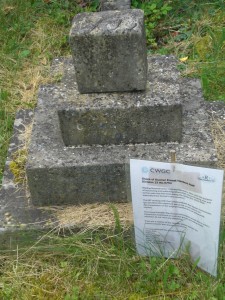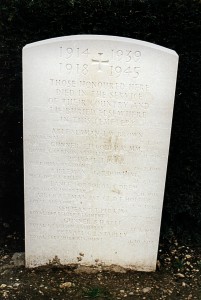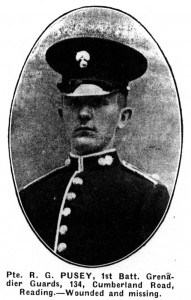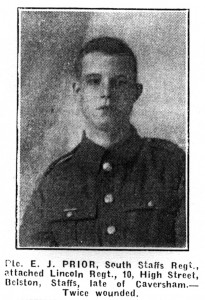Ralph George Pusey
Guardsman 16604
Number 4 Company,
1st Battalion Grenadier Guards
Ralph George Puseywas the only son of Frank Howard and Sarah Jane Pusey of 134, Cumberland Road. He had one onlder and two younger sisters. He had attended the Wokingham Road School (now Alfred Sutton Primary School) and his name appears on their war memorial. The 1911 census indicates that at age 15 years he was a baker’s errand boy, his father was a labourer at the biscuit factory.
Ralph is believed to have been in the regular army when war was declared on 4th August 1914. He spent August and September in training, leaving England for Zeebrugge on the 5th October as part of the BEF (British Expeditionary Force). By the time Pusey and his regiment had arrived the original BEF had already been in action. After marching for almost two weeks the BEF engaged in the Battle of Mons on 23rd August. When it was realised that the British troops were out numbered, an orderly withdrawal, starting on 24th August and lasting many days was begun. The BEF marched, south. On the 26th August some battalions fought a holding operation which became known as the Battle of Le Cateau. By September 6th the BEF had marched, in the heat of summer, over one hundred miles to the Marne. There they fought a four day battle which ended with the British pursuing the Germans who were moving northwards. Heavy fighting then took place around the Aisne and Albert on the Somme. When the Grenadier Guards landed in Zeebrugge on October 7th the Germans were occupying an area around Ypres. Belgian soldiers were in action around the Yser canal and the British had been in battles at Aubers, Armentières, Neuve Chapelle and Warneton, in what was later named the Battle of Flanders.
When the Grenadier Guards arrived in Belgium they went by train and route march, stopping at various points along the way, to arrive at Ypres on the 14th October. One stop saw them billeted near a dye works and issued with velvet in lieu of blankets! When they arrived at their sector of the front they set up out posts between, what in time would be the famous or infamous, Menin and Messines Roads. The first Uhlans, cavalry soldiers of the German Sixth Army were sighted. The Guards dug defensive positions at Zandvoorde on the 16th October and moved forward to Kruiseecke on the 17th October. There the battalion began an attack on the 19th October but were soon ordered to withdraw. On the 20th October the Germans attacked the Guards positions in the afternoon, coming within 200 yards of their line. Ralph Pusey was probably killed during this attack. The 19th October 1914 marked, what historians later referred to as, the start of the First Battle of Ypres.
Ralph’s parents were initially informed that Ralph was wounded and reported missing on the 24th October. This information was published in the Reading Standard 2nd January 1915. Further detail stated that he was believed to be a prisoner of war. However, his body was never found and he had no known grave. Ralph Pusey was 19 years old.
Two memorials were constructed to commemorate the men who were lost in this and the subsequent battles of Ypres. The Menin Gate, carries 54,896 names of men lost in Ypres before 1916 and the near by memorial at Tyne Cot which commemorates another 35,000 soldiers with no known grave, killed after 1916.



